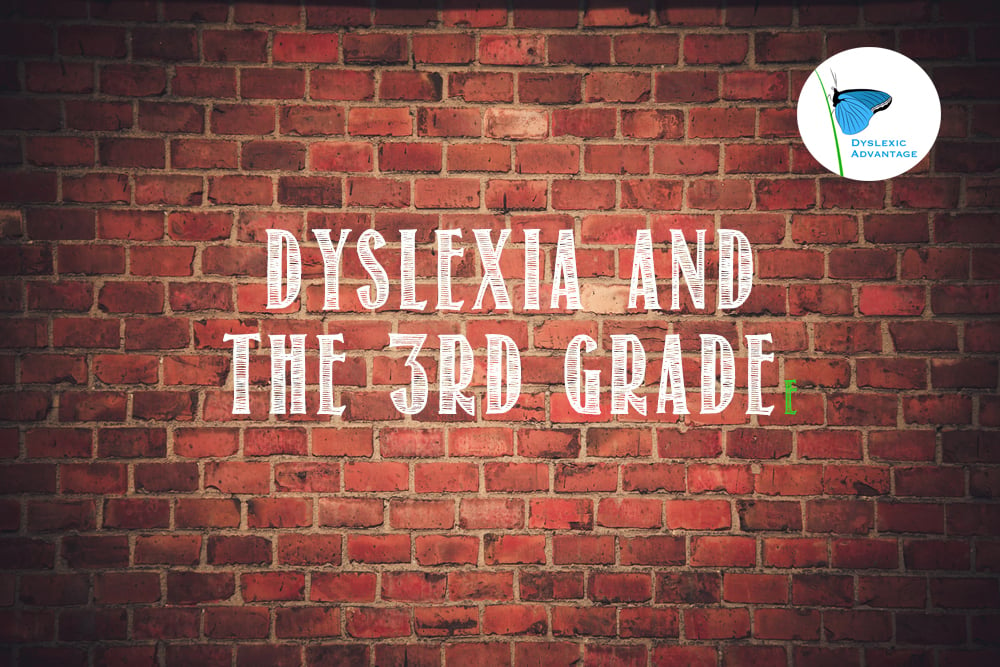Great advice from Stephen Key at Additude. For many adult dyslexics, running your own business is the best way to build on strengths and create a positive working environment. Stephen offers the following helpful advice for those at the beginning their journey. “1. I prepare for every situation. My learning disability has caused me to fear the unknown. Feeling prepared soothes my nerves. Before I attend a meeting, I make sure to have an agenda. I like knowing what is expected of me. Because I don’t like being caught off guard, I am constantly studying up — on all sorts of topics. Much to my wife’s amusement, I even studied up on the first book we read for our neighborhood book club. When I’m traveling, […]
What’s the Most Stressful Time for Dyslexic Students?
ANSWER: Grades 3-5 in Elementary School. If we know this, are we doing everything we can to help students emotionally and socially in these grades? There are many pressures that converge on the 3-5th grade (see The 3rd Grade Wall), and developmentally, it is a...
Effect of Strength-Based Coping on Children’s Stress and Coping
From Australia: "Strength-based parenting is an approach where parents deliberately identify and cultivate positive states, processes and qualities in their children," Professor Waters said. "This style of parenting adds a 'positive filter' to the way a child reacts...
Dyslexia and the Third Grade Wall
If you're not aware if the '3rd Grade Wall', you can get blind-sided. A recurring theme that we hear about when we interview accomplished dyslexic men and women is the trouble and failure (often grade retention) that happens in the 3rd grade. Why? What's the big deal...
Surviving Parent Teacher Conferences [Premium]
Parent-Teaching Conferences can be stressful for both parents and teachers. Keep your eye on the big picture, think strategically, and work toward a positive year for your student in the classroom. Often the amount of time you have with the teacher is quite short because of the total number of students involved. As a result, plan on showing up to see how the beginning of the year is progressing and focus on finding solutions if your students is lagging behind or having difficulties. If you’ve purchase Dyslexia, Dysgraphia, or Dyscalculia Teacher cards, now is a good time to use them. Quick Tips for Parent Teacher Conferences If Your Student is Dyslexic: Make a Positive First Impression – This may be the first time your meeting this teacher and she […]
Teaching Bilingual ELL Students with Dyslexia in the General Classroom [Premium]
Almost 1 out of every 10 students in public school classrooms are English Language Learners (ELLs). Because dyslexia is also common throughout the world (10-15%), some ELL students are dyslexic. For ELLs, identifying dyslexia can be a complicated process, sorting out the effects of language exposure, bilingualism (or multilingualism), and vocabulary in the 2nd language. Regardless, general education teachers can incorporate many ‘best practices’ that can support all of their students whether they ELL only ELL who are also dyslexic. The challenge for teachers of bilingual students is that they may not have an easy way of knowing how to factor in a student’s prior language instruction and exposure and how that impacts dyslexia per se. Whenever possible, students benefit by academic vocabulary and concept […]
How They Did It: Dyslexia, Gifted Ed, and SAT and ACT Accommodations [Premium]
Today I had a chance to catch up with a member of our Dyslexic Advantage community who had just heard the great news that her 17 year old son had been granted accommodations for both the SAT and ACT, including the calculator-free section of the new SAT. This family navigated several difficult transitions: private school to public gifted school, middle to high school, and now college entrance exams. Accommodations granted this student included: Double time for reading, computer for essay, extra breaks between test sessions, reader, double time for math, double time for essay, record answers in test book, 4-function calculator on non-calculator active sections Hooray! Mom sent all the previous evaluations from All Kinds of Minds (Mel Levine’s old system), but also old speech […]
The Wisdom of Pooh and Dyslexia
“You are braver than you believe, and stronger than you seem, and smarter than you think.” – A.A. Milne Winnie the Pooh’s advice is smarter than we may think when it comes to encouraging young readers. What’s better than reading intervention and working memory training? Reading intervention and working memory + education about intelligence. If students believe they are not intelligent or bad at school, that negative mindset is likely to sabotage even well-planned educational programs. Students who believe that they become more intelligent step-by-step by persistence and hard work, are significantly higher achieving in reading and working memory, but also math and science. Now researchers are discovering that some studies that didn’t discover significant improvements in working memory training may have been due to this […]

![Dyslexic Entrepreneur’s Advice for the Road [Premium]](https://www.dyslexicadvantage.org/wp-content/uploads/2017/07/Screen-Shot-2019-09-01-at-8.30.50-AM.jpg)



![Surviving Parent Teacher Conferences [Premium]](https://www.dyslexicadvantage.org/wp-content/uploads/2016/10/parent-teacher-conferences.jpg)
![Teaching Bilingual ELL Students with Dyslexia in the General Classroom [Premium]](https://www.dyslexicadvantage.org/wp-content/uploads/2016/10/ELL-our-shutterstock.jpg)
![How They Did It: Dyslexia, Gifted Ed, and SAT and ACT Accommodations [Premium]](https://www.dyslexicadvantage.org/wp-content/uploads/2016/09/Screen-Shot-2019-09-10-at-1.59.16-PM.jpg)














